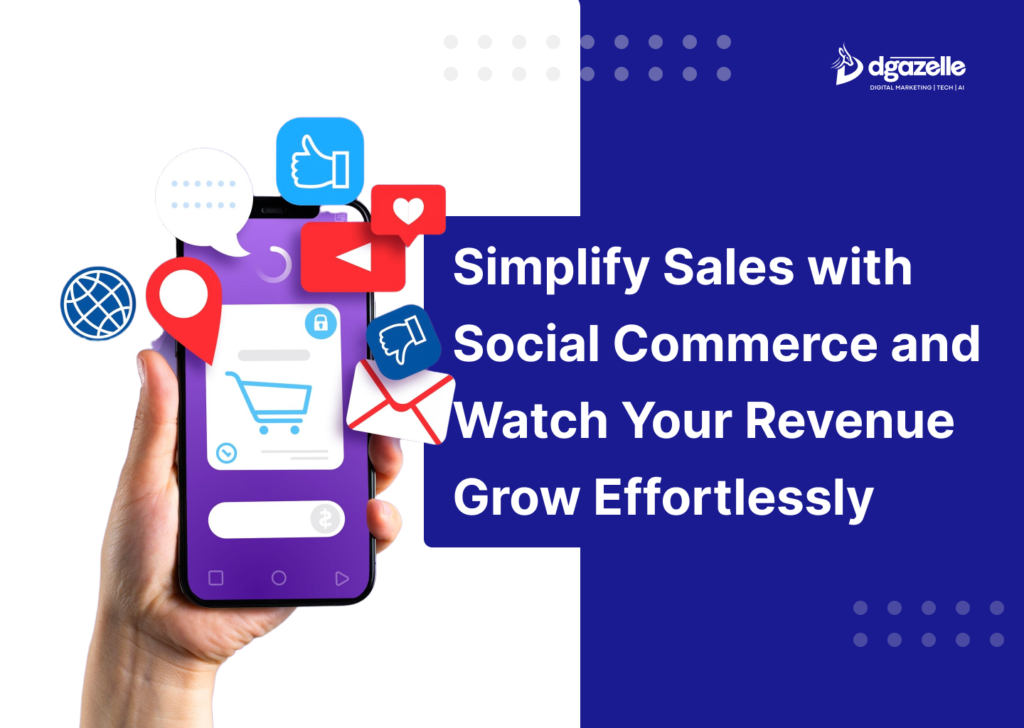In October 2021, Li Jiaqi and Viya, two of China’s most famous live-streamers, sold a staggering $3.1 billion worth of items—nearly three times the sales average for Amazon. This jaw-dropping figure shows the power of social commerce, a rapidly growing trend that is changing how people shop online.
Social commerce is all about using social media platforms to generate revenue for your eCommerce business. Whether you like it or not, online shopping is the new normal. Social commerce is transforming how users shop and is projected to grow by $1.2 trillion globally by 2025.
In Nigeria, where social media usage continues to soar, social commerce offers an incredible opportunity for business owners to reach a wider audience. Small enterprises are now able to connect with more customers than ever before, boosting their sales effortlessly.
In this article, we’ll explain how social commerce works and how you can leverage it to grow your eCommerce revenue.
What is Social Commerce?
Let’s start with what social commerce is not. It’s not just about promoting your products on social media and driving potential buyers to your website. That’s traditional social media marketing.
Modern-day social commerce takes things further by bringing the entire shopping journey onto social media. In other words, social commerce allows customers to discover, learn about, and purchase products without ever leaving their favorite social platforms. This seamless experience keeps customers engaged and boosts sales by reducing the friction of switching between apps.
Here’s how a typical social commerce buying experience works:
- A shopper logs into their favorite social media app.
- They discover your product through engaging posts, stories, videos, or other interactive elements.
- Without leaving the app, they buy the product right then and there.
While likes, shares, and comments measure engagement, true social commerce success is about revenue. The better you are at selling in-app, the more your profits grow.
This approach is especially powerful in Nigeria, where social media usage is booming, making it an essential strategy for business owners looking to simplify sales and grow revenue effortlessly.
Ecommerce vs. Social Commerce
Ecommerce and social commerce are often confused, but they serve different purposes in the online shopping journey.
Ecommerce refers to internet shopping through a website or branded app like Amazon, eBay, or Jumia. Shoppers visit these platforms via desktop or mobile, browse products, and complete purchases. It relies heavily on traditional digital marketing strategies like ads and email campaigns to drive traffic to the site.
On the other hand, social commerce is an evolved version of ecommerce influenced by how social media impacts buying decisions. It keeps the entire shopping experience within the social platform itself. From product discovery to checkout, everything happens in-app, making the journey seamless and efficient.
One of the key differences lies in the purchasing process. Ecommerce often involves multiple steps, increasing the chances of cart abandonment. In contrast, social commerce eliminates unnecessary steps, allowing customers to purchase instantly through social media. This streamlined experience reduces friction, leading to higher conversion rates.
Save time and grow your business while we create engaging content that resonates with your audience. Get started today!
Why is social commerce important?
With over 4.5 billion social media users globally, social commerce is expanding at a pace faster than traditional eCommerce, indicating a shift in consumer purchasing behavior toward more integrated social experiences.
The growth is largely fueled by the creator economy, where influencers have become pivotal in shaping purchasing decisions, especially among Millennials and Gen Z, who are increasingly using social media for shopping inspiration and transactions. This shift represents not just a change in how people shop but where and who they trust, making social commerce a critical focus for modern eCommerce strategies.
Emerging Social Commerce Trends
Staying ahead in social commerce means embracing trends that resonate with your audience. Here are two emerging trends that are shaping the future of social selling:
1. Live Stream Commerce
Livestream shopping is revolutionizing the way people shop online. Influencers and brands are now going live on social media to showcase products in real time. From try-on hauls to product demonstrations, livestreams allow potential buyers to see products in action, ask questions, and make purchases without leaving the app. This interactive shopping experience boosts customer engagement and drives sales.
Although live stream shopping originated in China, it’s rapidly gaining popularity worldwide. For instance, Facebook introduced Live Shopping Fridays, featuring renowned brands like Sephora. In Nigeria, this trend is catching on as local influencers use Instagram and TikTok live sessions to promote products, making it a powerful strategy for reaching younger audiences.
2. Augmented Reality (AR)
AR is changing the way customers experience products online. It allows users to virtually “try on” items or visualize how products would look in real-life settings. For example, shoppers can see how furniture fits in their homes or how makeup shades complement their skin tones—all through their smartphones.
Leading platforms like Snapchat and Pinterest are leveraging AR to enhance shopping experiences. In Nigeria, this presents a unique opportunity for fashion and beauty brands to offer virtual try-ons, increasing buyer confidence and reducing return rates.
By integrating these trends into your social commerce strategy, you can enhance customer experiences, boost engagement, and ultimately grow your revenue effortlessly.
Free up your schedule and watch your brand thrive with our strategic social media management. Contact us now to learn more!
Best Social Commerce Platforms
Social commerce thrives on platforms where users actively engage with content and discover products organically. Here’s a breakdown of the top social commerce platforms and how they can boost your sales:
1. Facebook
Facebook ranks as the leading social commerce platform, with nearly 74% of shoppers discovering new products here. Its seamless shopping experience is powered by Facebook Shops, which allows businesses to create an online store for free. Users can purchase directly through the app or be redirected to your website. You can also create collections, tag products in posts, and run targeted ads to reach potential buyers. If you’re using Wix, you can link it to your Facebook Shop for unified inventory management.
2. Instagram
Instagram is ideal for visually-driven marketing, ranking as the second-most popular social commerce platform in the U.S. with 32.4 million buyers. Its integration with Facebook Shop allows for a unified selling experience. Instagram offers features like Shoppable Ads, Stories, Videos, and Reels, which let users purchase products without leaving the app. The Instagram Drops feature also creates hype around limited-edition products.
3. TikTok
TikTok is a rising star in social commerce, known for its powerful influence on buying decisions. Hashtags like #TikTokMadeMeBuyIt have billions of views, and the platform offers in-app purchases, live shopping, and shoppable ads. Brands leveraging Hashtag Challenge Plus Ads can create buzz around their products, driving massive engagement and sales.
Tips for Building a Successful Social Commerce Strategy
- Choose the Right Platforms: Focus on platforms that align with your target audience’s demographics instead of being on every social media channel.
- Choose the Right Products: Social commerce works best for products like apparel, electronics, and cosmetics that are impulse buys. For longer purchase journeys, use it to maintain brand awareness.
- Be Authentic: Avoid hard sells. Use a conversational, relatable tone that feels genuine and engaging, making your brand approachable and personable.
- Actively Listen: Monitor customer interactions, respond quickly, and encourage reviews. Maintain consistent attention and responsiveness across all channels.
Conclusion
Social commerce is a great way to earn revenue for your ecommerce business. By utilizing the power of social media, you can reach a larger audience and sell more products. Plus, social commerce is easy to set up and manage, so you can focus on running your business instead of worrying about marketing. If you’re not already using social commerce to earn revenue for your ecommerce business, now is the time to start.
Struggling with Consistent Social Media? Dgazelle’s Got You Covered!
Leave the planning, posting, and engagement to us. Elevate your online presence effortlessly. Reach out and see the difference!







